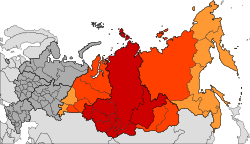Portal:Siberia
The Siberia Portal
A portal dedicated to Siberia
Introduction
Siberia | |
|---|---|
Geographical region | |
 Siberian Federal District |
Siberia (/saɪˈbɪəriə/ sy-BEER-ee-ə; Russian: Сибирь, romanized: Sibir', IPA: [sʲɪˈbʲirʲ] ) is an extensive geographical region comprising all of North Asia, from the Ural Mountains in the west to the Pacific Ocean in the east. It has formed a part of the sovereign territory of Russia and its predecessor states since the centuries-long conquest of Siberia, which began with the fall of the Khanate of Sibir in the late 16th century and concluded with the annexation of Chukotka in 1778. Siberia is vast and sparsely populated, covering an area of over 13.1 million square kilometres (5,100,000 sq mi), but home to roughly a quarter of Russia's population. Novosibirsk, Krasnoyarsk, and Omsk are the largest cities in the area.
Because Siberia is a geographic and historic concept and not a political entity, there is no single precise definition of its territorial borders. Traditionally, Siberia spans the entire expanse of land from the Ural Mountains to the Pacific Ocean, with the Ural River usually forming the southernmost portion of its western boundary, and includes most of the drainage basin of the Arctic Ocean. It is further defined as stretching from the territories within the Arctic Circle in the north to the northern borders of Kazakhstan, Mongolia, and China in the south, although the hills of north-central Kazakhstan are also commonly included. The Russian government divides the region into three federal districts (groupings of Russian federal subjects), of which only the central one is officially referred to as "Siberian"; the other two are the Ural and Far Eastern federal districts, named for the Ural and Russian Far East regions that correspond respectively to the western and eastern thirds of Siberia in the broader sense.
Siberia is known for its long, harsh winters, with a January average of −25 °C (−13 °F). Although it is geographically in Asia, Russian sovereignty and colonization since the 16th century has led to perceptions of the region as culturally and ethnically European. Over 85% of its population are of European descent, chiefly Russian (comprising the Siberian sub-ethnic group), and Eastern Slavic cultural influences predominate throughout the region. Nevertheless, there exist sizable ethnic minorities of Asian lineage, including various Turkic communities—many of which, such as the Yakuts, Tuvans, Altai, and Khakas, are Indigenous—along with the Mongolic Buryats, ethnic Koreans, and smaller groups of Samoyedic and Tungusic peoples (several of whom are classified as Indigenous small-numbered peoples by the Russian government), among many others. (Full article...)
Selected article -
Pleistocene Park (Russian: Плейстоценовый парк, romanized: Pleystotsenovyy park) is a nature reserve on the Kolyma River south of Chersky in the Sakha Republic, Russia, in northeastern Siberia, where an attempt is being made to re-create the northern subarctic steppe grassland ecosystem that flourished in the area during the last glacial period.
The project is being led by Russian scientists Sergey Zimov and Nikita Zimov, testing the hypothesis that repopulating with large herbivores (and predators) can restore rich grasslands ecosystems, as expected if overhunting, and not climate change, was primarily responsible for the extinction of wildlife and the disappearance of the grasslands at the end of the Pleistocene epoch.
The aim of the project is to research the climatic effects of the expected changes in the ecosystem. Here the hypothesis is that the change from tundra to grassland will result in a raised ratio of energy emission to energy absorption of the area, leading to less thawing of permafrost and thereby less emission of greenhouse gases. It is also thought that removal of snow by large herbivores will further reduce the permafrost's insulation. (Full article...)
Interesting facts -
- Richard Maack (pictured) was a Russian naturalist who led some of the first major scientific expeditions to remote Siberia and the Russian Far East.
- Many Japanese POWs continued to toil in Siberian labor camps ten years after the end of World War II.
- Constantine Possiet was the first Russian minister to support the project of a Trans-Siberian Railway.
General topics
- Prehistory of Siberia
- History of Siberia
- Geography of Siberia
- North Asia § Geography
- Demographics of Siberia
- Indigenous peoples of Siberia
- Category:Flora of Siberia – includes flora taxa that are native to Siberia. Taxa of the lowest rank are always included. Higher taxa are included only if endemic.
- Siberia Governorate
- Siberian Republic
- Great Russian Regions
- Trans-Siberian Railway
Need assistance?

Do you have a question about Siberia that you can't find the answer to? Consider asking it at the Wikipedia reference desk.
General images -
Related portals
WikiProjects
Categories
Trans-Siberian Railway route map
| Trans–Siberian Railway | |||||||||||||||||||||||||||||||||||||||||||||||||||||||||||||||||||||||||||||||||||||||||||||||||||||||||||||||||||||||||||||||||||||||||||||||||||||||||||||||||||||||||||||||||||||||||||||||||||||||||||||||||||||||||||||||||||||||||||||||||||||||||||||||||||||||||||||||||||||||||||||||||||||||||||||||||||||||||||||||||||||||||||||||||||||||||||||||||||||||||||||||||||||||||||||||||||||||||||||||||||||||||||||||||||||||||||||||||||||||||||||||||||||||||||||||||||||||||||||||||||||||||||||||||||||||||||||||||||||||||||||||||||||||||||||||||||||||||||||||||||||||||||||||||||||||||||||||||||||||||||||||||||||||||||||||||||||||||||||||||||||||||||||||||||||||||||||||||||||||||||||||||||||||||||||||||||||||||||||||||||||||||||||||||||||||||||||||||||||||||||||||||||||||||||||||||||||||||||||||||||||||||||||||||||||||||||||||||||||||||||||||||||||||||||||||||||||||||||||||||||||||||||||||||||||||||||||||||||||||||||||||||||||||||||||||||||||||||||||||||||||||||||||||||||||||||||||||||||||||
| |||||||||||||||||||||||||||||||||||||||||||||||||||||||||||||||||||||||||||||||||||||||||||||||||||||||||||||||||||||||||||||||||||||||||||||||||||||||||||||||||||||||||||||||||||||||||||||||||||||||||||||||||||||||||||||||||||||||||||||||||||||||||||||||||||||||||||||||||||||||||||||||||||||||||||||||||||||||||||||||||||||||||||||||||||||||||||||||||||||||||||||||||||||||||||||||||||||||||||||||||||||||||||||||||||||||||||||||||||||||||||||||||||||||||||||||||||||||||||||||||||||||||||||||||||||||||||||||||||||||||||||||||||||||||||||||||||||||||||||||||||||||||||||||||||||||||||||||||||||||||||||||||||||||||||||||||||||||||||||||||||||||||||||||||||||||||||||||||||||||||||||||||||||||||||||||||||||||||||||||||||||||||||||||||||||||||||||||||||||||||||||||||||||||||||||||||||||||||||||||||||||||||||||||||||||||||||||||||||||||||||||||||||||||||||||||||||||||||||||||||||||||||||||||||||||||||||||||||||||||||||||||||||||||||||||||||||||||||||||||||||||||||||||||||||||||||||||||||||||||
External media
Most populated areas

Associated Wikimedia
The following Wikimedia Foundation sister projects provide more on this subject:
-
Commons
Free media repository -
Wikibooks
Free textbooks and manuals -
Wikidata
Free knowledge base -
Wikinews
Free-content news -
Wikiquote
Collection of quotations -
Wikisource
Free-content library -
Wikiversity
Free learning tools -
Wiktionary
Dictionary and thesaurus
































































